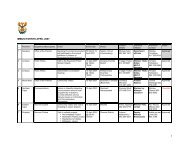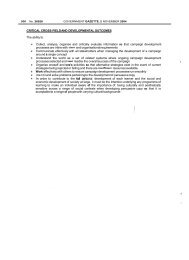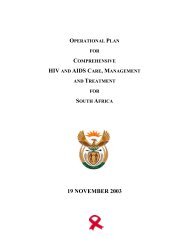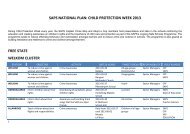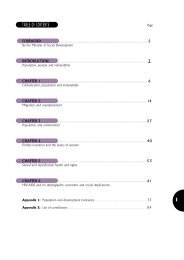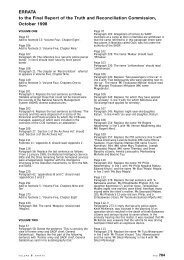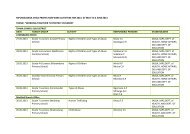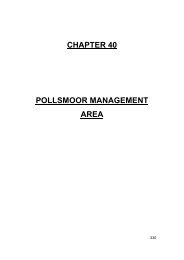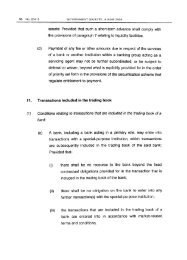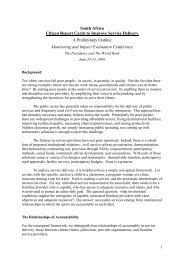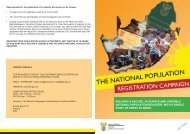Macroeconomic strategies, agriculture and rural poverty in post ...
Macroeconomic strategies, agriculture and rural poverty in post ...
Macroeconomic strategies, agriculture and rural poverty in post ...
Create successful ePaper yourself
Turn your PDF publications into a flip-book with our unique Google optimized e-Paper software.
11<br />
The employment <strong>and</strong> growth potential associated with high value food exports must be<br />
weighed aga<strong>in</strong>st the costs of an open economy to farmers <strong>and</strong> farm workers produc<strong>in</strong>g field<br />
crops like maize, wheat <strong>and</strong> oil seeds for the domestic market. While exporters will emerge<br />
as w<strong>in</strong>ners <strong>in</strong> an open economy, the agricultural losers will be maize, wheat <strong>and</strong> oilseed<br />
farmers. Compet<strong>in</strong>g with maize <strong>and</strong> wheat imported from the United States or the European<br />
Union will be extremely difficult for South African farmers given the high subsidies <strong>and</strong><br />
<strong>in</strong>direct transfers that farmers cont<strong>in</strong>ue to enjoy. The United States, for <strong>in</strong>stance, has<br />
selected the South African market as part of its export promotion <strong>and</strong> subsidy programme<br />
under the ‘Export Promotion Programme.’ While WTO should theoretically open markets<br />
<strong>and</strong> promote freer trade <strong>in</strong> <strong>agriculture</strong>, it seems more likely that agricultural trade will simply<br />
be subject to new control <strong>and</strong> subsidy measures. Moreover, s<strong>in</strong>ce the provisions of the<br />
WTO are for tariff <strong>and</strong> subsidy reduction rather than the wholesale removal of trade barriers,<br />
the impact of freer trade depends on the <strong>in</strong>itial level of protection. Levels of protection have<br />
always been much higher <strong>in</strong> the United States <strong>and</strong> the European Union <strong>and</strong> they will therefor<br />
reta<strong>in</strong> higher subsidies under WTO regulations. Rather than promot<strong>in</strong>g freer trade, it seems<br />
that one of the impacts of the WTO will allow countries <strong>in</strong> North America <strong>and</strong> Europe<br />
greater access to the markets of develop<strong>in</strong>g countries to the detriment of local field crop<br />
producers <strong>and</strong> workers (Keet 1996).<br />
The dismantl<strong>in</strong>g of domestic subsidies <strong>and</strong> regulations <strong>in</strong> the period s<strong>in</strong>ce the mid-1980s<br />
has made field crop farm<strong>in</strong>g <strong>in</strong> South Africa even more vulnerable to imports. Producer<br />
subsidies <strong>and</strong> per capita transfers to <strong>agriculture</strong>, for example, are much lower for South<br />
African farmers than they are for farmers <strong>in</strong> Europe or the United States (Agrifutura 1996).<br />
Indeed, the entire regulatory environment for <strong>agriculture</strong> has changed radically with the<br />
amendment of agricultural market<strong>in</strong>g legislation, the withdrawal of direct state subsidies, <strong>and</strong><br />
the replacement of quantitative restrictions on food imports with tariffs <strong>in</strong> l<strong>in</strong>e with the<br />
GATT. Dur<strong>in</strong>g most years, these differences will allow US farmers to deliver wheat <strong>and</strong><br />
animal feed to Cape Town at prices that are below production costs of the same crop <strong>in</strong><br />
South Africa (Williams 1996). In a more open economy, <strong>and</strong> <strong>in</strong> the context of an agricultural<br />
policy which is committed to a ‘viable market-directed farm<strong>in</strong>g sector’, considerable<br />
restructur<strong>in</strong>g of maize, wheat <strong>and</strong> oilseed farm<strong>in</strong>g is likely to occur. The shift from maize<br />
farm<strong>in</strong>g to stock or game farm<strong>in</strong>g, a production regime that requires much less labour, will<br />
probably be hastened <strong>in</strong> this new regime. Employment creation <strong>and</strong> growth <strong>in</strong> this sector<br />
appears far less likely under Gear <strong>and</strong> uneven <strong>rural</strong> development is almost certa<strong>in</strong>ly one of the<br />
most important long term impacts of an open oriented economy. What private <strong>in</strong>vestment<br />
does occur <strong>in</strong> the <strong>rural</strong> areas is likely to follow sectors with the potential for export earn<strong>in</strong>g<br />
rather than on those sectors focused on the local market. Job creation <strong>and</strong> growth <strong>in</strong> the<br />
long term is therefore far more likely <strong>in</strong> <strong>rural</strong> regions focused on exports: the Western Cape,<br />
parts of the Northern Prov<strong>in</strong>ce, Mpumalanga, Eastern <strong>and</strong> Northern Cape. In contrast, the<br />
maize <strong>and</strong> wheat grow<strong>in</strong>g regions of Mpumalanga, the Free State <strong>and</strong> the North West are<br />
likely to experience job losses <strong>and</strong> decl<strong>in</strong>e, especially <strong>in</strong> the context of a macroeconomic<br />
policy which puts such faith <strong>in</strong> private sector <strong>in</strong>vestment for growth <strong>and</strong> job creation. One<br />
of the more significant impacts of Gear will be the way it reshapes <strong>and</strong> transforms <strong>rural</strong><br />
economies <strong>and</strong> wage earn<strong>in</strong>g opportunities.<br />
The emphasis of both domestic agricultural <strong>and</strong> macroeconomic policies on exporters at<br />
the expense of farm<strong>in</strong>g that is focused on local consumption has important implications for<br />
food security <strong>and</strong> job creation, particularly <strong>in</strong> <strong>in</strong>dustries that are l<strong>in</strong>ked to farm<strong>in</strong>g through<br />
backward or forward l<strong>in</strong>kages. The apartheid government’s commitment to national food<br />
security is clearly no longer an important policy consideration at the domestic agricultural or<br />
the macroeconomic policy level <strong>and</strong> this shift is mirrored <strong>in</strong> numerous other policy papers



